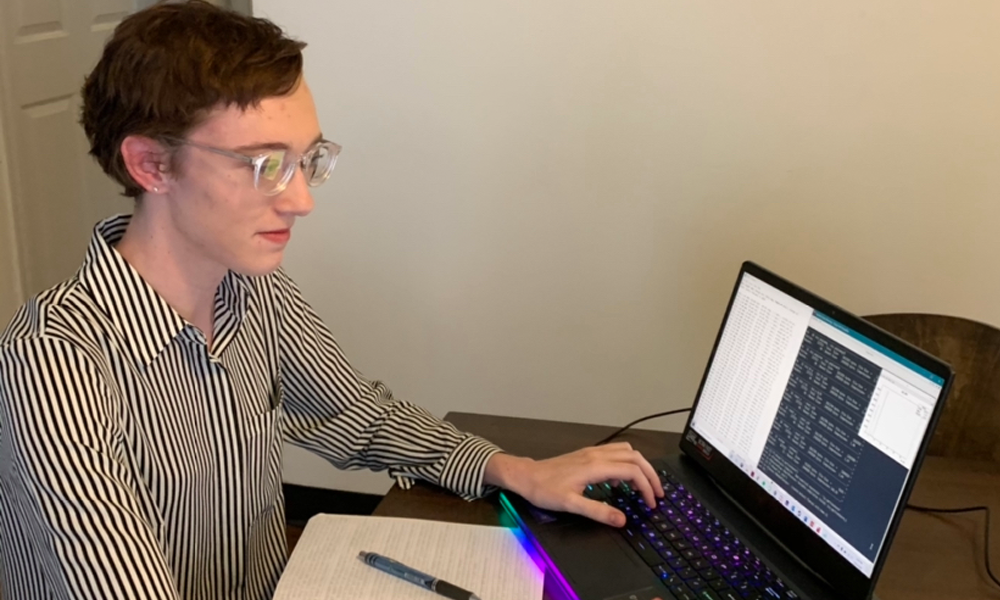JMU physics major has big plans researching tiny particles
JMU News
Elizabeth Moore took two years of advanced placement physics in high school—just for fun.
She wasn’t thinking about physics as a career option when she enrolled at James Madison University in 2018 as a music industry major. A required physics course reignited her love of the subject, and while still “fun,” physics is turning into a career endeavor, and a promising one at that.
This semester, Moore has started working on a research project supported by the U.S. Department of Energy’s Thomas Jefferson National Accelerator Facility in Newport News, Virginia. She received the news in July that she was one of two students selected for the Jefferson Science Associates Minority/Female Undergraduate Research Assistantship program, which includes a $6,000 stipend.
Professor Ioana Niculescu, who nominated Moore, said the project involves graduate-level work, but she has no doubt Moore is ready for it. “She is smart and good with computers,” Niculescu said.
Moore said she is researching what happens to electrons when they are shot into liquid hydrogen and other targets in a high-energy beam. “We know a lot about electrons already in the physics community, but this data is working in a slightly different area that has less data,” she said. “We’re hoping that it lines up with other data that has already been presented and with what we expect to see theoretically.”
Niculescu added that the experiments are looking at the quark structure of the nucleon using high-energy electrons as probes. The results will help understand the interaction between the quarks and the formation of the nucleons by providing precise data in a less explored kinematic region. The hope, she said, is that the data will constrain theoretical models aimed at completing the picture of the nucleon at the femptometer (a millionth of a billionth of a meter) scale.
The experiments have already been run, so Moore can do her research from Harrisonburg. At the end of her assistantship, she will write a paper for JLab explaining what she did during the year, but that won’t be the end of it. Even after the assistantship ends, she expects the research to continue and ultimately lead to a more detailed paper, perhaps something that could be published in a peer-reviewed journal.
“It’s allowing me to go really deep into physics in an area that I haven’t looked at before and really explore my options for what I want to do in graduate school and beyond,” said Moore, who plans to pursue a doctorate in physics after graduating from JMU in 2022. As for a career, she is considering becoming a university professor or a laboratory researcher.
She credits Niculescu with being an important influence on her current work and her future plans. “It has been really fantastic to see such an amazing scientist like her who is doing work at JLab and also working as a professor and coaching undergraduate research students,” she said. “It’s inspiring to have a female scientist as a role model.”
Moore said there are a number of female students in the upper-level physics courses and she highly recommends the JMU Department of Physics and Astronomy to females interested in science. “Our department does a great job of encouraging minorities and women to speak out about issues that they’re concerned with, and also they have programs for minorities and women to showcase science to people, especially schoolchildren who may not realize this is an option for them,” she said.
About the JSA Minority/Female Undergraduate Research Assistantship
Funds for M/FURA are provided through the JSA Initiatives Fund Program, established by the owners of JSA to support programs, initiatives and activities that further the scientific outreach and promote the science, education and technology missions of Jefferson Lab in ways that complement its basic and applied research focus.
About JMU Physics and Astronomy
The James Madison University Department of Physics and Astronomy within the College of Science and Mathematics is an undergraduate-only department with 20 faculty members and more than 100 students. We strive to be a leading undergraduate physics and astronomy department by building a research-active, student-centered community.
Media contact: Eric Gorton, gortonej@jmu.edu, 540-908-1760.
# # #
